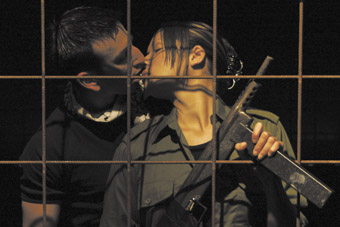the limits of healing
caroline wake: sidetrack’s checkpoint zero

Charles Billeh, Cassandra Swab, Checkpoint Zero
photo Assad Abdi
Charles Billeh, Cassandra Swab, Checkpoint Zero
THE INVITATION TO CHECKPOINT ZERO SOUNDS PROMISING. SIDETRACK’S LATEST PLAY TELLS THE “STORY OF THE EFFECTS OF CONFLICT ON CURRENT GENERATIONS AND THE DILEMMAS INVOLVED IN INHERITING THE WOUNDS FROM THE PAST.” THIS LATTER PHRASE IS PARTICULARLY SUGGESTIVE—HOW DOES ONE INHERIT A WOUND?—AND IT REMINDS ME OF FILM THEORIST AND HISTORIAN KAJA SILVERMAN’S CLAIM THAT “TO REMEMBER OTHER PEOPLE’S MEMORIES IS TO BE WOUNDED BY THEIR WOUNDS…IT IS TO LET THEIR STRUGGLES, THEIR PASSIONS, THEIR PASTS, RESONATE WITHIN ONE’S OWN PAST AND PRESENT, AND DESTABILISE THEM.”
Checkpoint Zero, then, promises to create a sort of Silvermanian space, where we can remember other people’s memories, be wounded by their wounds and be destabilised by the past. More specifically, the play invites us into the Palestinian past and present and in doing so promises to “shatter the perceptions of one of the world’s longest lasting conflicts.”
The play begins with two Israeli soldiers, Yoram (Dritan Arbana) and Benny (Eddie Khalil), standing behind a vast wire screen, manning their checkpoint. They boast about gang raping a 13-year-old Palestinian girl for a week. They also enjoy a good curfew, which they consider “a licence to terrorise the terrorists”, and enforce it with the attitude of “zero tolerance, maximum security, maximum fun.” While this opening scene works to make the play’s sympathies abundantly clear, it also risks immediately alienating the audience because these characters seem to have no redeeming features whatsoever.
Working at the same checkpoint is another, more reluctant soldier, Sivan (Cassandra Swaby). The monotony and brutality of the checkpoint routine are effectively portrayed as the Palestinians circle around and around, displaying their hands as their identity cards. When the overzealous Yoram pulls Hani (Charles Billeh) aside and interrogates him for several hours, Sivan takes pity and gives him a Mars Bar. Something sparks and the next time Hani comes through the checkpoint there is some rather laboured flirting—“They don’t call me the Mars Bar princess for nothing,” she breathes—numbers are exchanged and a star-crossed love story ensues. Many of these scenes are played to the front, presumably in an effort to position the audience as confidante. Unfortunately this undermines the intense connection the lovers are supposed to share. Two interactions at the checkpoint and a brief encounter on the dance floor are apparently enough for Hani to declare love. Inevitably, Sivan finds it all too much and the two separate.
Thankfully, the story is more interesting and the staging more inventive away from the romance. The idiocy of bureaucracy is nicely conveyed when a Palestinian mother confronts an officious Israeli secretary only to be winched above the stage in order to literally “hang in there” while waiting. There is another striking moment when all three women scale the fence to frame their faces in the wire squares and Assad Abdi’s giddy video projections work to evoke a world off balance and out of kilter. The performances of Siliva Entcheva and Olivia Stambouliah are particularly strong in these scenes: the former plays a slightly tarty singer (delivering some soaring songs), an Israeli Lieutenant, and Hani’s mother while the latter portrays a Palestinian girl, an Israeli mother, and Hani’s grandmother. This last character is later revealed to have been Jewish before marrying her husband and converting to Islam. This revelation prompts the previously hesitant Sivan to see the humanity in Hani, the possibility of a future together, and the two are reunited.
In this way, Hani’s alterity is easily recovered and the play reveals itself as deeply conservative, despite its claims to the contrary. Far from “shatter[ing] the perceptions of the world’s longest lasting conflict”, Checkpoint Zero risks reinforcing them because neither the narrative nor the characters within it are sufficiently nuanced. None of the characters emerge as complicated, conflicted human beings and the Israeli soldiers come close to caricature. Moreover, the story depends on the female soldier to mobilise compassion and imagines a heterosexual couple and their future family unit as a metonym for the single-state solution. Even within its own limited terms, the play cannot in fact imagine a future for them and ends Hamlet-style with bodies strewn about the stage.
While part of the problem lies with the romantic storyline (the rest of the play has potential), another part lies with the expectations encouraged by the publicity. In vowing to investigate inherited wounds and to shatter perceptions, Checkpoint Zero simply promises more than it, or any other play for that matter, could possibly deliver.
Checkpoint Zero, conceived by Assad Abdi and Don Mamouney, writer and director Don Mamouney, cast Dritan Arbana, Charles Billeh, Silvia Entcheva, Eddie Khalil, Olivia Stambouliah, Cassandra Swaby, lighting design Jocelyn Speight, video projection design Assad Abdi, costume design Sue Liolio, set and sound design Don Mamouney; Sidetrack, July 28-Aug 24
RealTime issue #87 Oct-Nov 2008 pg. 14






